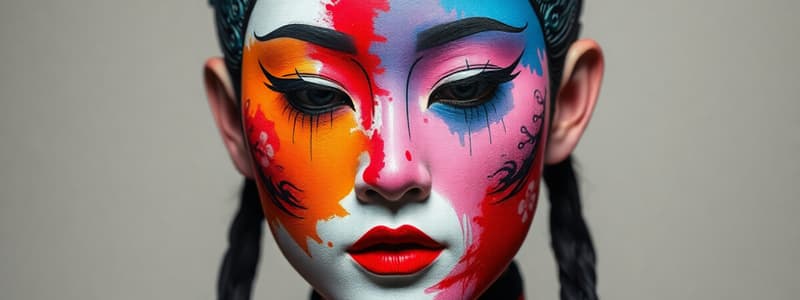Podcast
Questions and Answers
What is the original name of Peking Opera mask or Jingju Lianpu?
What is the original name of Peking Opera mask or Jingju Lianpu?
False Mask
What is the significance of different collars in Peking Opera?
What is the significance of different collars in Peking Opera?
Different collars in accordance with the performing characters' personality and historical awareness.
What color is used for the hero type in Peking Opera?
What color is used for the hero type in Peking Opera?
Simple colors, often with the hero type being painted in simple colors.
Which characters represent courage, devotion, uprightness, bravery, and loyalty?
Which characters represent courage, devotion, uprightness, bravery, and loyalty?
Which characters represent ambition, cool-headedness, and fierceness?
Which characters represent ambition, cool-headedness, and fierceness?
Which characters represent impulsive, violent, lacks self-restraint?
Which characters represent impulsive, violent, lacks self-restraint?
Which characters represents fierceness and roughness, rough and bold character?
Which characters represents fierceness and roughness, rough and bold character?
Which characters represent uprightness and cool-headedness and noble?
Which characters represent uprightness and cool-headedness and noble?
Which characters represent craftiness, treachery, suspiciousness, villain on stage?
Which characters represent craftiness, treachery, suspiciousness, villain on stage?
What is Jiang Gan in Chinese Opera?
What is Jiang Gan in Chinese Opera?
What is Xiao hu lian?
What is Xiao hu lian?
What is the significance of gold and silver colors in Chinese Opera makeup?
What is the significance of gold and silver colors in Chinese Opera makeup?
What is Kabuki Makeup or Kesho?
What is Kabuki Makeup or Kesho?
What is Mukumi-Gume or Suji-Gume?
What is Mukumi-Gume or Suji-Gume?
What is Standard makeup?
What is Standard makeup?
What is Kumadori makeup?
What is Kumadori makeup?
What is Nihon Guma?
What is Nihon Guma?
What is Mukimi Guma?
What is Mukimi Guma?
Flashcards
Jingju Lianpu
Jingju Lianpu
Peking Opera mask
Guan Ju
Guan Ju
Hero type in Jingju; red color
Huang Pang
Huang Pang
Jingju character; yellow color
Zhu Wen
Zhu Wen
Signup and view all the flashcards
Zhang Fei
Zhang Fei
Signup and view all the flashcards
Lian Po
Lian Po
Signup and view all the flashcards
Cao Cao
Cao Cao
Signup and view all the flashcards
Jiang Gan
Jiang Gan
Signup and view all the flashcards
Xiaohualian
Xiaohualian
Signup and view all the flashcards
Study Notes
Jingju Lianpu Masks
- False musk is the original name of Peking opera masks or Jingju lianpu
- Different collars represent different characters personalities and historical assessments
- Characters painted in simple colors, enemies & bandits have complicated colors
- Different colors have specific traits
- Red: Courage, devotion, uprightness, bravery, loyalty
- Yellow: Ambition, cool-headedness, fierceness
- Green: Impulsive, violent, lacks self-restraint
- Black: Fierceness, roughness, bold character
- Purple/Reddish Purple: Uprightness, cool-headedness, nobility
- White: Craftiness, treachery, suspiciousness, villainous on stage
Chinese Opera Makeup
- Jiang Gan: Chinese Opera's clown, or chou,
- Xiao hualian: A pretty painted face, special makeup pattern around the nose, a small patch of chalk to show a secretive and mean character. Also painted on young pages or jesting
- Gold and silver colors denote gods and spirit
Kabuki Makeup
- Kabuki makeup, or Kesho, is an interpretation of the actor's own role of facial features. Example of face painting
- Two Types of Kabuki Makeup
- Standard makeup
- Kumadori makeup - applied to most actors, villains, and heroes
- Mukumi-Guma or Suji-Guma
Nihon Guma and Mukimi Guma
- Nihon Guma: Characters with strength
- Mukimi Guma: Young, handsome, virtues
Studying That Suits You
Use AI to generate personalized quizzes and flashcards to suit your learning preferences.
